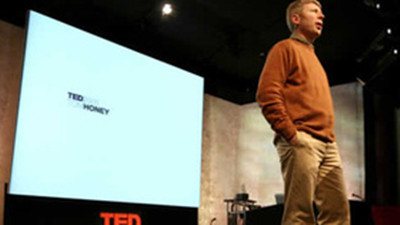The supreme commander toying with expendable units in a great campaign.
在一场大战中,最高指挥官玩弄着可被牺牲掉的部队。
We are still left with a God who can do the tsunami and allow Auschwitz.
留给我们的仍然是一个可以引发海啸、允许奥斯威辛集中营存在的上帝。
In his great novel, The Brothers Karamazov, Dostoevsky gives these words to Ivan,addressed to his naive and devout younger brother, Alyosha:
在著名的小说《卡拉马佐夫兄弟》中,陀斯妥耶夫斯基以伊万之口,对他天真虔诚的弟弟阿辽沙说:
If the sufferings of children go to make up the sum of sufferings which is necessary for the purchase of truth,then I say beforehand that the entire truth is not worth such a price.
如果需要用孩子们的痛苦来凑足购买真理所需的代价的话,我会事先说,整个真理不值这个价钱。
We cannot afford to pay so much for admission.
我们买不起这么昂贵的入场券。

It is not God that I do not accept.
我不是不接受上帝,
I merely, most respectfully, return Him the ticket.
我只是恭敬地退回他的门票而已。
Or perhaps God set the whole universe going at the beginning and then relinquished control forever,so that natural processes could occur, and evolution run its course.
或者也许,上帝在创造整个宇宙的时候设定好了一切,然后永远地放弃了控制,因此过程可以自然地发生,按进化论而展开。
This seems more acceptable,but it still leaves God with the ultimate moral responsibility.
这似乎更加容易接受一些,但这仍然使上帝负有最终的道德责任。
Is God a cold, unfeeling spectator?
上帝是一个冷酷无情的旁观者吗?
Or a powerless lover, watching with infinite compassion things God is unable to control or change?
或者上帝爱莫能助,以无限的同情看着事情的发生,而无法控制或改变?
Is God intimately involved in our suffering,so that He feels it in His own being?
上帝是否深切地感受到我们的痛苦,从而觉得那也是他自己的痛苦?
If we believe something like this, we must let go of the puppet-master completely,take our leave of the almighty controller, abandon traditional models.
如果我们相信这样的观点,我们必须彻底抛弃认为上帝是傀儡操纵者,全能主宰者的看法,放弃传统的信仰模式。
We must think again about God.
我们必须重新思考上帝。
Maybe God doesn't do things at all.
也许上帝什么事也没做。
Maybe God isn't an agent like all of us are agents.
也许上帝不是我们这样的代理人。
Early religious thought conceived God as a sort of superhuman person,doing things all over the place.
早期的宗教思想认为上帝是一种超人,到处做一些事情。比如:
Beating up the Egyptians, drowning them in the Red Sea, wasting cities, getting angry.
殴打埃及人,把他们淹死在红海,毁灭城市,大发雷霆。
The people knew their God by His mighty acts.
人们通过上帝的这些超凡举动认识上帝。
But what if God doesn't act? What if God doesn't do things at all?
但是,如果上帝没有举动呢?如果上帝根本没有做任何事情呢?
What if God is in things?
如果上帝就在事物中呢?
The loving soul of the universe.
比如是宇宙中关爱的灵魂,
An in-dwelling compassionate presence, underpinning and sustaining all things.
支撑并维持所有事物存在的内在的一股仁慈的能量。
What if God is in things?
如果上帝就在事物中呢?
In the infinitely complex network of relationships and connections that make up life.
在构成生命的无限复杂的关连网络中,
In the natural cycle of life and death,
在必然不断发生的生命与死亡、
the creation and destruction that must happen continuously.
创造与毁灭的自然周期中,
In the process of evolution.
在进化的过程中,
In the incredible intricacy and magnificence of the natural world.
在令人难以置信的复杂性和自然界的辉煌中,
In the collective unconscious, the soul of the human race.
在集体无意识、人类的灵魂中,
In you, in me, mind and body and spirit.
在你中、我中,头脑中、身体中和精神中,
In the tsunami, in the victims. In the depth of things.
在海啸中,在死难者中,在事物的深处,
In presence and in absence. In simplicity and complexity.
在存在与虚无中,在简单和复杂中,
In change and development and growth.
在变化、发展、壮大中。
How does this in-ness, this innerness, this interiority of God work?
怎么合理诠释上帝的这种 同在性、内性、内在性 ?
It's hard to conceive, and begs more questions.
人们难以理解,并提出更多的问题。
Is God just another name for the universe,
也许上帝只是宇宙的另一个名字,
with no independent existence at all?
而根本不是一个独立的存在?
I don't know.
我不知道
To what extent can we ascribe personality to God?
在多大程度上我们可以给上帝赋予人格?
I don't know.
我不知道。












